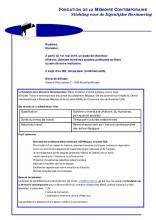CfP: Sixth European Congress on World and Global History: Minorities, Cultures of Integration, and Patterns of Exclusion
Following the successful and rewarding meetings of the European Congresses on World and Global History held in Leipzig, Dresden, London, Paris, and Budapest the next ENIUGH Congress will take place in Turku, hosted by the Global History Laboratory at Åbo Akademi.

